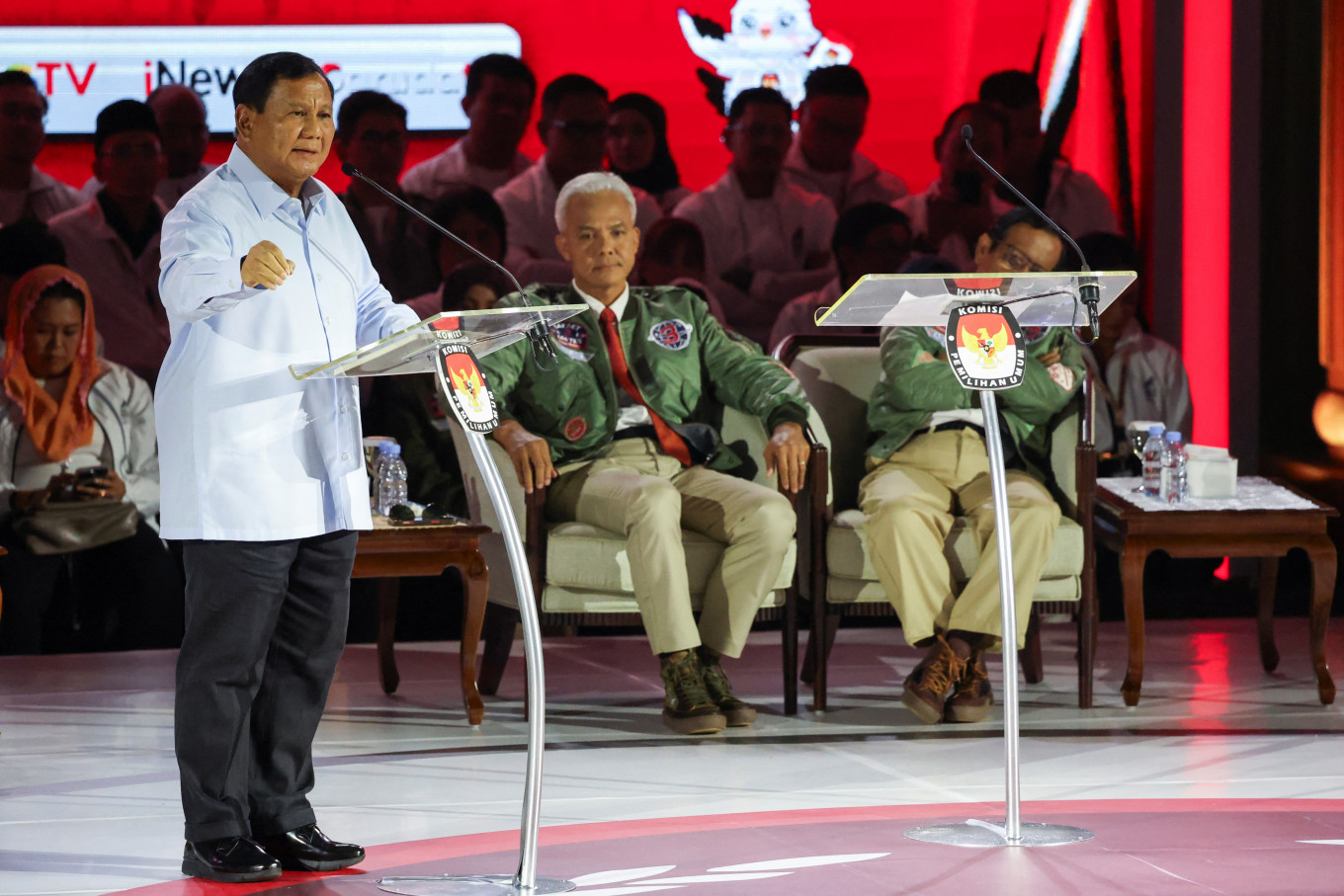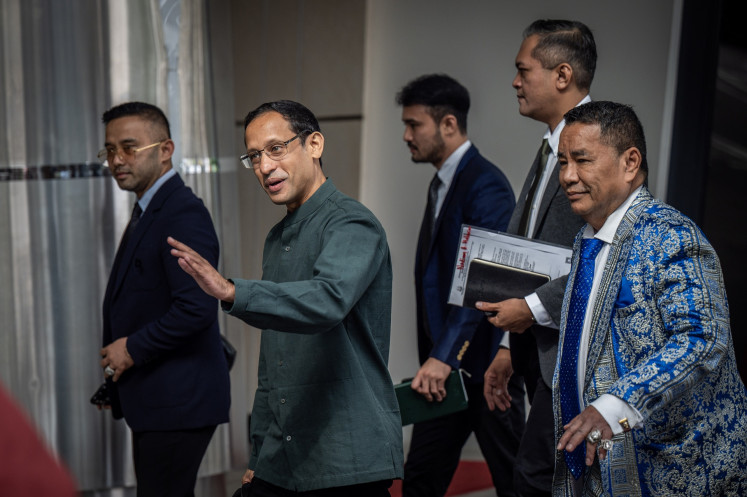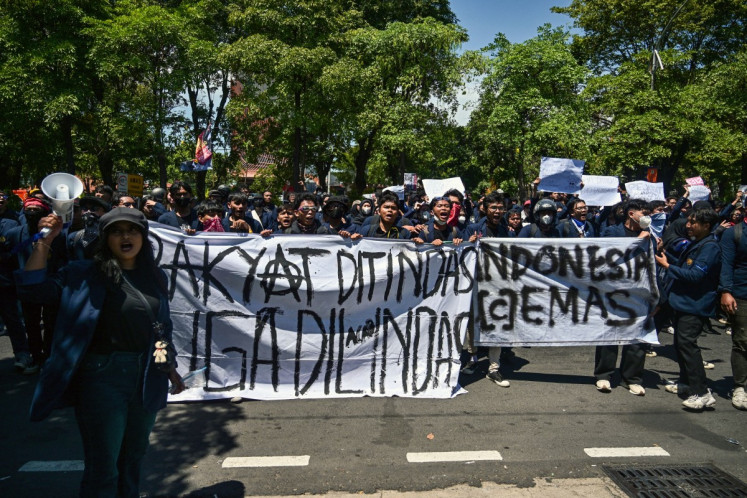Popular Reads
Top Results
Can't find what you're looking for?
View all search resultsPopular Reads
Top Results
Can't find what you're looking for?
View all search resultsPrabowo on back foot in heated debate
Fiery exchanges unfolded during the third debate, topics that were especially sensitive for Prabowo, who has sought to position himself as the torchbearer of the current administration and is the race’s current frontrunner.
Change text size
Gift Premium Articles
to Anyone

Presidential candidate Prabowo Subianto was put on the defensive in Sunday’s third electoral debate, which explored international relations, defense and security, as the defense minister’s rivals scrutinized his weapons procurement plans and defense spending in an uncertain geopolitical landscape.
Fiery exchanges on government debt, institutional management and Indonesia’s defense systems unfolded during the event, topics that were especially sensitive for Prabowo, who has sought to position himself as the torchbearer of the current administration and is the race’s current frontrunner.
But with many key aspects of the country’s foreign policy left unexplored, analysts were skeptical that Indonesia would soon see the diplomatic breakthroughs the candidates promised.
The debate touched on a variety of themes related to foreign policy, defense and security, from promoting Indonesia’s soft and hard power overseas to bolstering defense spending and leading by example on the global stage.
The temperature at the Gelora Bung Karno Sports Stadium rose in the first 30 minutes of the debate, when opposition figure and former Jakarta governor Anies Baswedan lamented Indonesia’s failure to deal with transnational crime, particularly cybercrime, citing an “ironic” incident in November 2023 when the Defense Ministry’s website was breached.
Anies went on to outline his plan to deal with new and non-traditional threats.

“First, we need to build a comprehensive system. Second, we need new technology procurement. Third, we need a fast recovery system,” he said.
Read also: 2024 Election Debate: Round 3In response, Prabowo appeared to question Anies’ experience in the area.
“I think that Pak Anies is too focused on theory. Everything he says sounds very flowery, but the problem here is Indonesia’s human resources. This is the core issue. It’s not just about pleasantries,” he said, minutes after riling up the crowd by interrupting Anies’ speech.
Prior to the debate, the campaigns sparred over the modernization of the Indonesian Military (TNI), with some citing lackluster progress in achieving the country’s minimum essential force (MEF) target as the core of its security troubles.
Former Central Java governor Ganjar Pranowo, whose campaign manifesto promotes bolstering the TNI and establishing a strong domestic defense industry, called for prudence in military spending, saying that the government must “be very careful” in taking on new debt, as it could put the nation’s sovereignty at stake.
The topic of military spending has become a hot national issue of late, especially after the government’s decision in late November 2023 to increase the state budget allocation for defense to US$25 billion annually.
“We shall not have debt, we shall not have hand-me-downs,” proclaimed Ganjar in an apparent jab at Prabowo’s procurement of used weapons systems in recent years.
Prabowo said he was certain that if Indonesia could pull off its downstreaming plan and become more prosperous, the threat of foreign intervention would all but disappear as Jakarta’s bargaining power on the global stage would increase.
On the topic of industrial downstreaming and a clear division of labor in the defense and security fields, Ganjar and Prabowo found the most common ground, with both candidates viewing economic might as a prerequisite for a more geopolitically prominent Indonesia. Anies, meanwhile, insisted that proactive diplomacy was equally important, especially for South-South Cooperation.
Between episodes of mudslinging, the candidates offered some hints about their thinking on current affairs.
Anies saw value in bolstering Indonesia’s soft power, whether through the coordinated export of cultural goods or by enlisting overseas university students and other members of the Indonesian diaspora to promote the nation’s cuisine.
Prabowo, meanwhile, reiterated his position that military strength and plugging weapons gaps were crucial, noting at one point that unprepared nations could get trampled in armed conflict.
Ganjar, meanwhile, suggested an overhaul of the decision-making process in ASEAN out of apparent disappointment in the bloc’s inability to find a solution to overlapping claims in the South China Sea.
Then Ganjar pounced on several opportunities to criticize the Defense Ministry’s spending under Prabowo, while Prabowo told Anies that bolstering soft power required money. Anies pointed out that Ganjar had failed to mention ASEAN as part of his geopolitical strategy.
Near the end of the debate, Prabowo acknowledged the slow progress on achieving former president Susilo Bambang Yudhoyono’s MEF program when grilled by Ganjar on the matter.
He said the COVID-19 pandemic had thrown a wrench into state spending and that he had to take certain stopgap measures, such as the procurement of used fighter jets from Qatar.
Read also: A defensive debate“As a minister, a team player, I have to be loyal [to the state], so I don’t talk much about it in public,” he said.
The MEF program will end this year after three five-year strategic plans (renstra) and was launched during Susilo Bambang Yudhoyono’s presidency in 2009.
According to data quoted by Ganjar, progress on the MEF program stands at around 65 percent.
Strategy or bluster?
Despite the many new suggestions offered during the debate, including Ganjar’s idea of creating a “cyber institution led by a three-star general” and Anies’ proposal to always include a “cultural delegation” on high-level state visits, experts remained unconvinced that any of the candidates had truly offered fresh and useful perspectives for a rapidly changing international order.
“The responses so far have been normative, if not borderline absurd,” said Lina Alexandra, head of the international department of the Center for Strategic and International Studies (CSIS), a Jakarta think tank.
“The agenda revolved mainly around weapons procurement, which is a shame because there were many interesting questions.”
Security analyst Yohanes Sulaiman of Jenderal Achmad Yani University echoed Lina’s sentiment, adding that it was both predictable and unproductive that Prabowo had been backed into a corner.
“If you want to talk about substance, then you can’t have an incumbent in the mix," he told The Jakarta Post.









